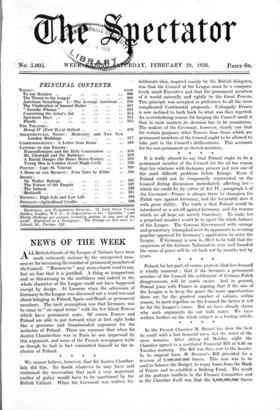We cannot believe, however, that Sir Austen Chamber- lain did
this. No doubt whatever he may have said contained the reservation that such a very important matter of policy would have to be sanctioned by the British' Cabinet. When -the Covenant was written the deliberate idea, inspired mainly by the British delegates, was that the Council of the League must be a compara- tively small Executive and that the permanent members of it would naturally and rightly be the Great Powers. This principle was accepted in preference to all the more complicated Continental proposals. Unhappily France is now, inclined to hark back to what was then rejected. An overwhelming reason for keeping the Council small is that in most matters its decision has to be unanimous. The makers of the Covenant, however, clearly saw that for certain purposes other Powers than those which are permanent members of the Council ought to be allowed to take part in the Council's deliberations. This accounts for the non-permanent or elected members.
*














































